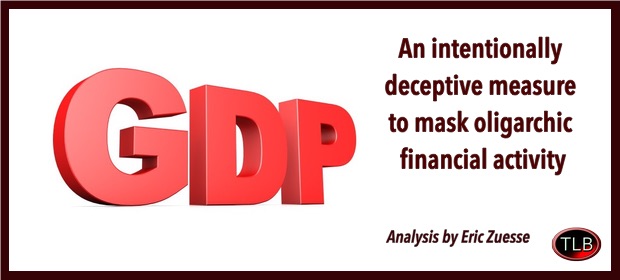
Why GDP Is Fake
ERIC ZUESSE
Gross Domestic Product, or GDP, is the most commonly used measure and ranking of a nation’s economy. According to the OECD and Wikipedia, its definition is: “an aggregate measure of production equal to the sum of the gross values added of all resident and institutional units engaged in production (plus any taxes, and minus any subsidies, on products not included in the value of their outputs).” No subtractions are included in it for debts that were undertaken in order to generate the given “gross values added.” A trillion dollars of increased assets (additional “gross values” of “production”) adds a trillion dollars to GDP, even if all of it was produced by increasing the debts by a trillion dollars: only the asset-side of the balance-sheet is relevant to GDP.
However, wealth is assets minus liabilities; it is assets minus debts; it is not assets alone. Therefore, a nation’s wealth has no necessary relationship at all to a nation’s GDP, because the nation’s wealth is its assets minus its liabilities, not its assets regardless of its liabilities (such as GDP is).
Britannica provides this definition of “GDP”: “Gross domestic product (GDP), total market value of the goods and services produced by a country’s economy during a specified period of time. It includes all final goods and services — that is, those that are produced by the economic agents located in that country regardless of their ownership and that are not resold in any form. It is used throughout the world as the main measure of output and economic activity.” In this definition, too, no subtractions are included in it for the debts. Britannica then goes on to state:
GDP = Consumption + Investment + Government Spending + Net Exports
or more succinctly
GDP = C + I + G + NX
where consumption (C) represents private-consumption expenditures by households and nonprofit organizations, investment (I) refers to business expenditures by businesses and home purchases by households, government spending (G) denotes expenditures on goods and services by the government, and net exports (NX) represents a nation’s exports minus its imports.
Kimberly Amadeo at “The Balance” uses that definition, and opens her article about GDP by saying: “Gross domestic product is the best way to measure a country’s economy. GDP is the total value of everything produced by all the people and companies in the country. It doesn’t matter if they are citizens or foreign-owned companies. If they are located within the country’s boundaries, the government counts their production as GDP.”
However, is GDP, in fact, “the best way to measure a country’s economy”? If you’re a banker whose income is derived from having a lot of money owed to you, then, of course, you will want to fool the public into believing that ignoring debts that were incurred in producing a given GDP is “the best way to measure a country’s economy,” because the more fools that believe it, the more income you will make, because people won’t be measuring their economic welfare by deducting from it the debts they owe. They will be deceived into thinking their country is in a better economic and financial position than it is, if the debts that it incurs are being ignored; this ignoring of debt in the ranking of nations’ economies will make easier for a government to take on more debt than it should.
Roy H. Webb, of the Richmond Fed, headlined in 1994, “The National Income and Product Accounts” and he presented there a lengthy breakdown of how GDP is calculated, but, yet again, nowhere in that article did any form of the terms “debt” or “liability” appear.
Isn’t it obvious that GDP is a fraud — and a very influential one?
MBA-Tutorials has an article “Shortcomings of GDP”, but it, too, doesn’t mention, in any form, “debts” or “liabilities”; and, so, it, too, is fake.
Bob McTeer, former President of the Dallas Fed, headlined in Forbes on 31 October 2012, “Hurricane Sandy And The Shortcomings Of GDP”, and he opened: “Natural disasters, like Hurricane Sandy, provide periodic reminders, not of the shortcomings of GDP necessarily, but what GDP is designed to measure and what it is not designed to measure.” In other words: the bankers excuse GDP because “it is not designed to measure” what it is being routinely used to measure. If the ordinary-language meaning of “GDP” is devoid of the liabilities side of the balance sheet, and ranks nations’ economic performance in that way — by ignoring any additional indebtedness that went into generating that additional “production” — then what language was Dr. McTeer even writing in there (since it wasn’t ordinary language — language as it’s commonly understood)? That statement by McTeer, too, therefore, is deceitful. In the rest of his article, he blathers on. And nowhere in that article, either, are the words “debts” or “liabilities” used, in any form.
Deceit regarding GDP is routine, just as such a fake ‘misuse’ of “GDP” is routine. (It’s really no “misuse” of the term, at all.) GDP is designed to be a misleading basis for ranking the economic performance of countries; it’s used for the purpose it’s intended for, because the purpose it’s intended for is to deceive the public in this very way — to ignore debt — and, so, that’s the way it’s used.
However, Charles Hugh Smith in several blogs explained the matter honestly, instead of (as is normally done) as a representative of the debt-industries, when he headlined on 19 October 2017, “GDP Is Bogus: Here’s Why”, and he presented there a superbly clear example which applies not only to Hurricane Sandy but to any natural disaster or war, and thus (by implication) constitutes a threat to not only the debt-industries (the financial firms) but also the man-made-disaster industries (the war-firms), such as Dwight Eisenhower famously (but only vaguely) referred to in his final words parting from the White House and handing it over to JFK in 1961, as “the military-industrial complex,” against which Eisenhower vaguely was warning there.
Charles Hugh Smith’s example, much clearer than McTeer’s blather, had allegedly come from some accountant, “Dave,” and presented (without linking to) the following:
Here’s Dave’s explanation:
Once I learned about accounting, I figured out why the GDP metric wasn’t sufficient. What is missing?
The balance sheet.
Hurricanes are a direct hit to your nation’s balance sheet. The national income statement goes up because of increased spending to replace lost assets, but the “equity” part of the national balance sheet ends up taking a hit in direct proportion to the damage that occurred. Even if you rebuild everything just the way it was, your assets remain the same, while your liabilities have increased.
We know this because we use the balance sheet equation: equity = assets – liabilities. Equity is another word for wealth.
Before hurricane:
wealth = (house + car) – (home debt + car debt)
After hurricane, you rebuild your house, and buy a new car, using borrowed money:
wealth = (house + car) – (2 x home debt + 2 x car debt)
Wealth (equity) has declined by the sum (home debt + car debt)
So when you see pictures of a hurricane strike, you can now look through all that devastation and see the impact on the balance sheet. National equity (wealth) just dropped by the amount of damage inflicted by the hurricane. Whether it is ever rebuilt doesn’t actually matter; that equity is just gone. Destruction is always a downside for equity – even if there is a temporary positive impact on the income statement.
Isn’t it interesting that the mainstream economists, who don’t use banks, debt, or money in their models, largely ignore balance sheets and instead just look at the income statement alone? Its almost as if the entire education system was organized so that people paid no attention to banks, debt, and money. Who do you think might benefit from our flock of PhD economists ignoring the extremely profitable debt-elephant in the room, and its purveyors, the banks?
By means of deceits such as using false measures of nations’ economic performance as do the aristocracy and its agents in all countries — the owners of banks like HSBC and of ‘defense’ contractors like Lockheed Martin, etc. can, and do — without resistance from academics whom those aristocrats likewise finance — use fake measures of nations’ economic performance so as to advance their own private economic performance, by fooling their narcoticized public into accepting these economic and financial bloodsuckers, accepting them by ignoring whatever blood might be lost in the process. Or: are they, too, merely fools? They function more like vampires than fools. But, apparently, the victims — here, the public — just don’t awaken from this bite, and so, it will probably continue until the next great economic crash, after which, yet again, the government will go into still more debt, in order to ‘recover’ from these ‘mistakes’. That sounds like a good business to be in — a stable business of the “heads I win, tales you lose” type. It might not be irresistible, but no one is resisting it. Now, why would that be?
************
Original article
ER recommends other articles by Strategic Culture Foundation
About the author
Investigative historian Eric Zuesse is the author, most recently, of They’re Not Even Close: The Democratic vs. Republican Economic Records, 1910-2010, and of CHRIST’S VENTRILOQUISTS: The Event that Created Christianity.




